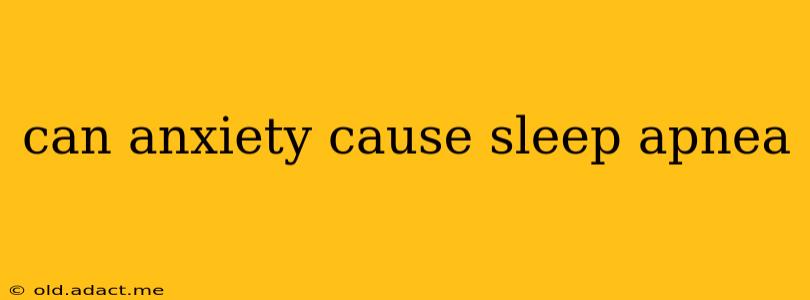Can Anxiety Cause Sleep Apnea? Exploring the Complex Relationship
Anxiety and sleep apnea are distinct conditions, but they can influence each other in surprising ways. While anxiety doesn't directly cause sleep apnea, it can exacerbate symptoms and contribute to its development in some individuals. Understanding this complex relationship is crucial for effective management of both conditions.
What is Sleep Apnea?
Sleep apnea is a sleep disorder characterized by pauses in breathing or shallow breaths during sleep. These pauses can last from a few seconds to minutes and occur repeatedly throughout the night, disrupting sleep quality and leading to daytime fatigue. There are three main types: obstructive sleep apnea (OSA), central sleep apnea (CSA), and complex sleep apnea syndrome (mixed). OSA, the most common type, occurs when the airway becomes blocked during sleep.
What is Anxiety?
Anxiety is a common mental health condition characterized by excessive worry, fear, and nervousness. Symptoms can vary greatly but often include restlessness, irritability, difficulty concentrating, and physical symptoms like rapid heartbeat, sweating, and shortness of breath. Chronic anxiety can significantly impact sleep and overall well-being.
Can Anxiety Worsen Sleep Apnea Symptoms?
Yes, anxiety can worsen sleep apnea symptoms. Here's how:
-
Increased Stress Hormones: Anxiety triggers the release of stress hormones like cortisol and adrenaline. These hormones can constrict airways, making it harder to breathe, especially during sleep. This constriction can worsen the severity of apnea episodes in individuals already predisposed to sleep apnea.
-
Muscle Tension: Anxiety often leads to increased muscle tension, including in the throat and neck muscles. This tension can further obstruct the airway, contributing to OSA. People with anxiety might clench their jaw or tense their neck muscles during sleep, exacerbating the problem.
-
Sleep Disturbances: Anxiety often manifests as difficulty falling asleep, frequent awakenings, and restless sleep. These sleep disturbances can interact with sleep apnea, leading to more frequent and severe apnea episodes. Poor sleep quality itself can worsen anxiety symptoms, creating a vicious cycle.
-
Increased Hyperarousal: People experiencing anxiety are often in a state of hyperarousal. This heightened state of alertness can interfere with the natural relaxation needed for restful sleep and can increase the likelihood of sleep disturbances and apnea episodes.
Does Anxiety Directly Cause Sleep Apnea?
No, anxiety does not directly cause sleep apnea. Sleep apnea has several underlying causes, including:
- Obesity: Excess weight in the neck area can constrict the airway.
- Genetics: A family history of sleep apnea increases the risk.
- Age: Sleep apnea becomes more common with age.
- Certain Medical Conditions: Conditions like nasal congestion, enlarged tonsils, and hormonal imbalances can contribute to sleep apnea.
However, the significant impact of anxiety on sleep quality and physiological responses means it can act as an exacerbating factor, making sleep apnea symptoms more severe and harder to manage.
Can Sleep Apnea Cause Anxiety?
Conversely, sleep apnea can also cause or worsen anxiety. The fragmented sleep, daytime fatigue, and cognitive impairments associated with sleep apnea can lead to feelings of irritability, nervousness, and increased stress levels, thus exacerbating pre-existing anxiety or triggering its onset.
How are Anxiety and Sleep Apnea Treated?
Treatment for both conditions often involves a multi-faceted approach:
- Sleep Apnea Treatment: This might include continuous positive airway pressure (CPAP) therapy, oral appliances, lifestyle changes (weight loss, avoiding alcohol and sleeping pills), and surgery in some cases.
- Anxiety Treatment: This could involve therapy (cognitive-behavioral therapy (CBT) is particularly helpful), medication, stress management techniques, and lifestyle adjustments.
It's essential to address both conditions concurrently to effectively manage symptoms and improve overall well-being. If you suspect you have either sleep apnea or anxiety, or both, consulting a healthcare professional is crucial for accurate diagnosis and personalized treatment plans.
What are the symptoms of sleep apnea?
Symptoms of sleep apnea can include snoring, gasping for air during sleep, daytime fatigue, morning headaches, difficulty concentrating, and irritability. These symptoms often overlap with the symptoms of anxiety, making accurate diagnosis important.
How is sleep apnea diagnosed?
Sleep apnea is usually diagnosed through a sleep study, either at home or in a sleep lab. This test monitors your breathing, heart rate, and brain waves during sleep to identify apnea episodes.
Can natural remedies help with sleep apnea and anxiety?
Some natural remedies may help manage symptoms, but they should not replace professional medical advice and treatment. These might include regular exercise, meditation, improved sleep hygiene, and dietary changes. However, their effectiveness varies greatly among individuals, and it's vital to discuss them with a healthcare provider.
